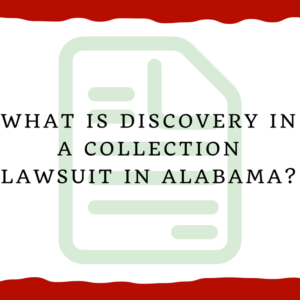What is discovery in a collection lawsuit in Alabama?
What is discovery in a collection lawsuit in Alabama?
 When you are sued by a debt collector in Alabama, you may wonder “What is this about ‘discovery’ and how does it apply to me?”
When you are sued by a debt collector in Alabama, you may wonder “What is this about ‘discovery’ and how does it apply to me?”
Discovery is simply where one side in a lawsuit (for example the debt collector who sued you) asks you questions or asks you to produce documents so that side can use that information to help it evaluate and win its case. You can do the same.
So let’s talk about the different types of discovery — broadly speaking there are two types.
- Written discovery
- Depositions
We’ll take a glance at written discovery first . . . .
Written Discovery — Interrogatories, Request for Production, and Request for Admissions
Discovery is sent in writing in three different forms.
Interrogatories are basically questions in writing that you have to answer in writing. Think of these as “interrogation” questions.
Request for production of documents are designed to get you to produce documents to the debt collector. It might be payment records or other billing information.
Request for admissions are where you are asked to admit or deny certain facts. For example, “Did you take out this credit card on ____ date” etc.
Normally you have 30 days to respond with answers or objections.
One critical point is if you go beyond 30 days you normally waive, or give up, your objections. And it you don’t answer the request for admissions, you admit them as being true. They normally are worded in a way to try to hurt you by getting you to admit you owe the debt and the debt collector (debt buyer) who sued you actually owns the debt. This is vital as the debt buyers struggle to prove they actually own the debt.
Now let’s look at verbal discovery — where you are asked questions under oath. . . .
Deposition: Questioned Under Oath
The way this works is you will be in a conference room with the other side’s lawyer and a court reporter. Then the lawyer will ask you questions.
Your lawyer can object if questions are improper but normally you answer all the questions asked.
You can also depose the other side if you like.
The court reporter is there to take down all the questions and answers and produce a written record of what was said. We call this the “deposition transcript.”
This is sworn testimony just like you would find in a trial.
Normally a deposition will take from 1/2 day to a full day and the preparation time is normally about 1 day or sometimes 2 days.
Having said all of this, not many collection lawsuits will have discovery . . . .
Is Discovery Common In Collection Lawsuits In Alabama?
Discovery is not common in collection cases.
In Small Claims Court, there is no discovery.
This is an absolute rule.
We used to see collection lawyers violate this rule and do so without any apology but I haven’t seen this happen in a long time.
You need to get permission for discovery in District Court.
You won’t have much discovery, if you get permission for discovery.
Usually a limited number of interrogatories (written questions) and request for production of documents (asking you for documents).
Overall in handling hundreds of cases, I have seen this only a handful of times.
But in Circuit court you can do discovery without permission of the court.
Occasionally the court will tell you that there are no depositions allowed but the normal rule is you can do all types of discovery.
OK, now we know about discovery but let’s back it up and figure out our options when sued as that is the most important thing . . . .
What Are My Options?
You have five options when sued:
- File bankruptcy — normally a terrible idea but occasionally it is appropriate
- Fight the lawsuit on your own — can be a good option in small claims or district court if you are willing to spend time
- Settle the lawsuit on your own — normally you are looking at a lump sum of about 50% or more and the account will stay on your credit report
- Hire a lawyer to fight the lawsuit — the objective here is to win as this may allow you to sue the debt collector
- Hire a lawyer to settle the lawsuit — you need to make sure it is a better deal than doing this yourself.
If you have questions about your options when sued in Alabama, please feel free to get in touch with us by calling us at 205-879-2447 or fill out a contact form.
Thanks for reading, and have a great day!
We represent consumers from all parts of Alabama
PS — you may enjoy our video where we answer over 150 questions about debt buyer lawsuits in Alabama. If you prefer to read, you can also find part one (transcript) here. When we are done posting all the parts, you’ll be able to read the entire transcript.
[…] we typically have the pretrial conference once discovery has […]